
W2 contractors, often mistaken for employees, may face uncertainties regarding unemployment benefits. Understanding the eligibility criteria and requirements for receiving unemployment benefits as a W2 contractor is essential. This article explores the legal framework governing unemployment benefits for W2 contractors and provides guidance on navigating these complexities.
Understanding W2 Contractors vs. Traditional Employees
W2 contractors, also known as W2 employees or workers, are typically individuals hired by a company on a contract basis but receive a W2 form at the end of the year, reflecting their earnings and tax withholdings. Unlike independent contractors who receive a 1099 form, W2 contractors are considered employees of the company for tax purposes. This designation means that the company withholds income tax, Social Security, and Medicare taxes from their wages, and provides benefits such as health insurance and retirement plans, depending on the contract terms.
In contrast, traditional employees are full-time or part-time workers who are directly employed by a company and receive a regular paycheck with taxes withheld. They may be eligible for a broader range of employee benefits and job protections. The key difference lies in the nature of their work relationship: W2 contractors generally have a defined contract period and specific terms of engagement, while traditional employees often have an ongoing, indefinite employment arrangement. This distinction is crucial in determining eligibility for various benefits, including unemployment insurance.
Overview of Unemployment Benefits
Unemployment benefits are financial assistance provided by the government to individuals who have lost their job through no fault of their own and are actively seeking new employment. These benefits are designed to offer temporary financial support while individuals are unemployed and searching for a new job. The amount and duration of benefits can vary based on state regulations and individual circumstances. Generally, these benefits include a weekly payment that aims to replace a portion of the lost income, helping to alleviate financial stress during periods of unemployment.
Who Qualifies for Unemployment Benefits?
Eligibility for unemployment benefits typically requires that individuals meet certain criteria, including having a sufficient work history and having earned a minimum amount of wages during a specified period. Applicants must also demonstrate that they are actively seeking work and are available to accept new employment. In many cases, individuals must be laid off due to circumstances beyond their control, such as company downsizing or restructuring. For some states, specific conditions may apply, and certain workers, including those on temporary or contract assignments, may face additional eligibility requirements.
Eligibility Criteria for Unemployment Benefits
Unemployment benefits are designed to provide financial assistance to individuals who are unemployed through no fault of their own and are actively seeking new employment. Generally, eligibility for these benefits requires meeting several key criteria:
- Employment History: Claimants must have a history of employment with a sufficient number of work hours or earnings within a specified period, often referred to as the base period.
- Reason for Unemployment: The unemployment must be involuntary. Claimants must not have been terminated for misconduct or voluntarily left their job without good cause.
- Ability and Availability to Work: Claimants must be physically able and available to work and actively seeking employment.
For W2 contractors, meeting these eligibility requirements can be more complex. W2 contractors might face challenges because:
- Employment Status: Since they are hired on a contract basis, their work may not meet the standard definitions of “employment” used for traditional employees. Their eligibility might be contingent upon the specific terms of their contract and the nature of their work.
- Contract Termination: If a W2 contractor’s contract ends, they may not automatically qualify for unemployment benefits unless they meet specific state requirements and can demonstrate that their unemployment was not due to voluntary resignation or misconduct.
In essence, while W2 contractors may have some eligibility for unemployment benefits, they must navigate additional layers of criteria and documentation to prove their eligibility compared to traditional employees.
Specific Conditions for W2 Contractors
| Condition | Description | Implications for W2 Contractors | Examples |
| Employment Type | Whether the contractor is classified as an employee or an independent contractor | W2 contractors are generally classified as employees, which affects their eligibility for unemployment benefits | A W2 contractor working on a fixed-term project |
| Reason for Unemployment | The cause of unemployment (e.g., contract expiration, termination) | W2 contractors must show that their unemployment was involuntary, not due to voluntary resignation or misconduct | Contract ending due to project completion |
| State Regulations | Different states have varying rules for unemployment benefits | Eligibility for W2 contractors may vary depending on the state’s specific unemployment insurance laws | Some states may offer benefits to contract workers; others may not |
| Contractual Terms | The specifics of the contract, including duration and conditions | Contractors must review their contract terms to ensure they meet the requirements for unemployment benefits | A contract with specific end-date clauses |
W2 contractors face several specific conditions when applying for unemployment benefits:
- Employment Type: As W2 contractors are classified as employees for tax purposes, they might have better access to unemployment benefits compared to independent contractors. However, their eligibility is still subject to specific conditions and the nature of their contract.
- Reason for Unemployment: To qualify for benefits, W2 contractors must demonstrate that their unemployment resulted from factors beyond their control, such as the expiration of their contract. Unemployment due to voluntary resignation or misconduct may disqualify them from receiving benefits.
- State Regulations: Eligibility for unemployment benefits can vary by state. Each state has its own rules and requirements for unemployment insurance, which can impact whether W2 contractors qualify. Contractors should check their state’s specific regulations to understand their eligibility.
- Contractual Terms: The terms of a contractor’s agreement can affect their eligibility for unemployment benefits. W2 contractors should review their contract details to ensure that the end of their employment aligns with the conditions required to qualify for benefits. Contracts with specific clauses or end dates might influence their claims.
State-Specific Regulations and Variations
Unemployment benefits in the United States are administered at the state level, which means each state has its own set of rules and regulations governing eligibility and benefits. This can create significant variability in how W2 contractors are treated when applying for unemployment benefits. Here are some key points to consider:
- Eligibility Requirements: States have different criteria for determining eligibility for unemployment benefits. While some states extend benefits to W2 contractors, others may not. Contractors should familiarize themselves with their state’s specific requirements to determine if they qualify.
- Benefit Amounts: The amount of unemployment benefits can vary widely between states. Each state sets its own maximum benefit amount and duration of benefits. W2 contractors may find that the benefits available to them are different from those available to traditional employees, depending on state regulations.
- Application Process: The process for applying for unemployment benefits can differ from state to state. Some states may have more streamlined application procedures, while others may require additional documentation or steps. W2 contractors should follow their state’s specific application guidelines to ensure their claims are processed correctly.
Key Points to Consider:
- Research State-Specific Regulations: Contractors should research their state’s unemployment insurance regulations to understand how their eligibility might differ from other states. This includes reviewing eligibility criteria, benefit amounts, and any state-specific rules.
- Understand Variations in Benefit Amounts: Be aware of how benefit amounts are calculated in your state and how they compare to other states. This knowledge can help in planning and financial management while receiving unemployment benefits.
- Follow State Application Procedures: Ensure that all required documentation is provided and that the application is completed according to state-specific guidelines. Missing or incorrect information can delay or jeopardize the claim.
By understanding these state-specific variations and regulations, W2 contractors can better navigate the unemployment benefits system and ensure they meet all necessary criteria for their claims.



